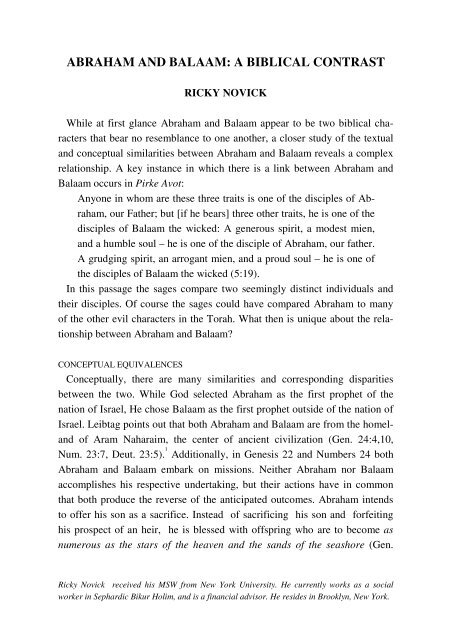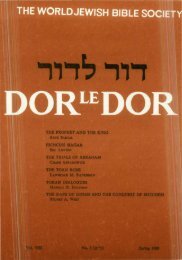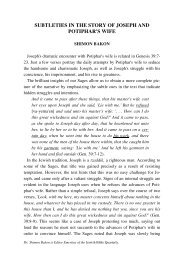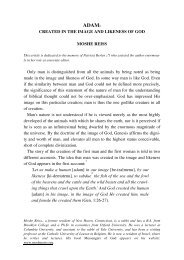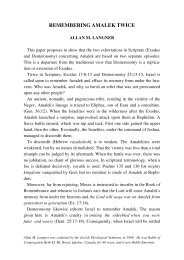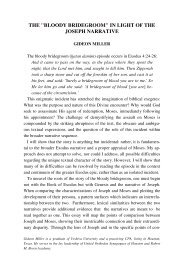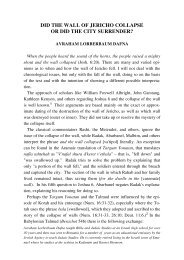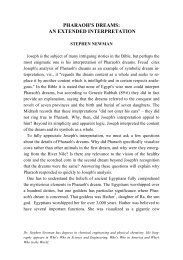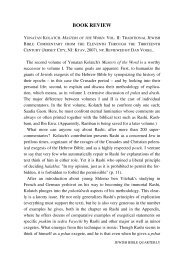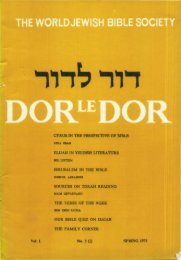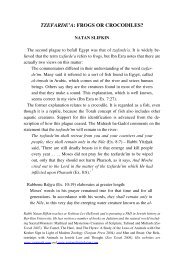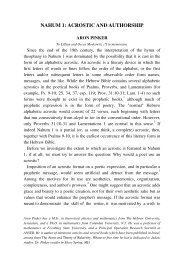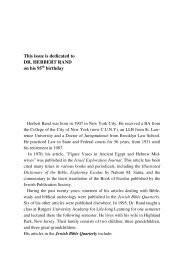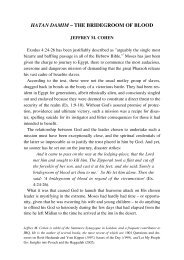abraham and balaam: a biblical contrast - Jewish Bible Quarterly
abraham and balaam: a biblical contrast - Jewish Bible Quarterly
abraham and balaam: a biblical contrast - Jewish Bible Quarterly
You also want an ePaper? Increase the reach of your titles
YUMPU automatically turns print PDFs into web optimized ePapers that Google loves.
ABRAHAM AND BALAAM: A BIBLICAL CONTRAST<br />
RICKY NOVICK<br />
While at first glance Abraham <strong>and</strong> Balaam appear to be two <strong>biblical</strong> characters<br />
that bear no resemblance to one another, a closer study of the textual<br />
<strong>and</strong> conceptual similarities between Abraham <strong>and</strong> Balaam reveals a complex<br />
relationship. A key instance in which there is a link between Abraham <strong>and</strong><br />
Balaam occurs in Pirke Avot:<br />
Anyone in whom are these three traits is one of the disciples of Abraham,<br />
our Father; but [if he bears] three other traits, he is one of the<br />
disciples of Balaam the wicked: A generous spirit, a modest mien,<br />
<strong>and</strong> a humble soul – he is one of the disciple of Abraham, our father.<br />
A grudging spirit, an arrogant mien, <strong>and</strong> a proud soul – he is one of<br />
the disciples of Balaam the wicked (5:19).<br />
In this passage the sages compare two seemingly distinct individuals <strong>and</strong><br />
their disciples. Of course the sages could have compared Abraham to many<br />
of the other evil characters in the Torah. What then is unique about the relationship<br />
between Abraham <strong>and</strong> Balaam?<br />
CONCEPTUAL EQUIVALENCES<br />
Conceptually, there are many similarities <strong>and</strong> corresponding disparities<br />
between the two. While God selected Abraham as the first prophet of the<br />
nation of Israel, He chose Balaam as the first prophet outside of the nation of<br />
Israel. Leibtag points out that both Abraham <strong>and</strong> Balaam are from the homel<strong>and</strong><br />
of Aram Naharaim, the center of ancient civilization (Gen. 24:4,10,<br />
Num. 23:7, Deut. 23:5). 1<br />
Additionally, in Genesis 22 <strong>and</strong> Numbers 24 both<br />
Abraham <strong>and</strong> Balaam embark on missions. Neither Abraham nor Balaam<br />
accomplishes his respective undertaking, but their actions have in common<br />
that both produce the reverse of the anticipated outcomes. Abraham intends<br />
to offer his son as a sacrifice. Instead of sacrificing his son <strong>and</strong> forfeiting<br />
his prospect of an heir, he is blessed with offspring who are to become as<br />
numerous as the stars of the heaven <strong>and</strong> the s<strong>and</strong>s of the seashore (Gen.<br />
Ricky Novick received his MSW from New York University. He currently works as a social<br />
worker in Sephardic Bikur Holim, <strong>and</strong> is a financial advisor. He resides in Brooklyn, New York.
ABRAHAM AND BALAAM: A BIBLICAL CONTRAST<br />
22:17). In a parallel vein, Balaam sets out to curse the nation of Israel but<br />
instead blesses them multiple times.<br />
Abraham <strong>and</strong> Balaam are undeniably disparate figures, even though there<br />
are common features in their stories. Abraham, a humble <strong>and</strong> spiritual man,<br />
focuses his energy on fulfilling the Divine will, whereas Balaam, a powerhungry<br />
<strong>and</strong> money-driven man, directs his energy toward thwarting the Divine<br />
will. Safren 2<br />
has noted how the word "donkey" – a common feature in<br />
both stories – is used to underscore Abraham's enhanced spirituality <strong>and</strong> Balaam's<br />
inferior heartlessness <strong>and</strong> cruelty. Whereas Abraham's donkey is<br />
merely a prop in the story of the heroism <strong>and</strong> valor of his rider, Balaam's is a<br />
main character, whose intelligence <strong>and</strong> insight overshadows Balaam.<br />
TEXTUAL PARALLELS<br />
Aside from the conceptual equivalences, there are numerous textual parallels<br />
within the narratives of the Akedah <strong>and</strong> Balaam’s mission. The most<br />
striking congruence is found in the description of preparations by Abraham<br />
<strong>and</strong> by Balaam for their respective tasks. Abraham rose early in the morning<br />
[vayashkem] <strong>and</strong> he saddled his ass [hamoro] (Gen. 22:3). In parallel form<br />
Balaam rose early in the morning [vayakom] <strong>and</strong> he saddled his ass [atono]<br />
(Num. 22:21). Significantly, these are the only two instances in the Torah in<br />
which the expressions of both rising in the morning <strong>and</strong> saddling an ass coincide.<br />
The sages comment on this juxtaposition of similar acts:<br />
R. Simeon b. Yohai said: Love upsets the natural order, <strong>and</strong> hate upsets<br />
the natural order. Love upsets the natural order: And Abraham<br />
rose early in the morning, etc: surely he had plenty of slaves? But<br />
the reason was that love upset the natural order. Hate upsets the natural<br />
order: And Baalam [sic] rose up early in the morning, <strong>and</strong> saddled<br />
his ass (Num. 22:21): surely he had plenty of slaves? Hate,<br />
however, upsets the natural order (Bereshit Rabbah 55:8).<br />
R. Simeon b. Yohai indicates the reason for this parallelism in the language<br />
describing Abraham's <strong>and</strong> Balaam's preparations. Abraham <strong>and</strong> Balaam were<br />
similar, as they both were motivated by extreme emotions that upset the natural<br />
order. Whereas Abraham was inspired by his love of God, Balaam was<br />
aroused by hatred towards the nation of Israel. Regardless of their different<br />
Vol. 35, No. 1, 2007<br />
29
30<br />
RICKY NOVICK<br />
motivations, the Torah identifies their intense emotions to awake early <strong>and</strong> to<br />
saddle their asses themselves instead of requesting help from their servants.<br />
In the continuation of the midrash, R. Simeon b. Yohai is once again<br />
quoted in relation to Abraham <strong>and</strong> Balaam. He states: "Let the saddling done<br />
by our father Abraham in order to go <strong>and</strong> fulfill the will of Him at whose<br />
word the world came into existence counteract the saddling done by Baalam<br />
in order to go <strong>and</strong> curse Israel" (Bereshit Rabbah 55:8). Thus, not only do the<br />
Torah's words indicate a correlation between Abraham's <strong>and</strong> Balaam's actions,<br />
but also R. Simeon b. Yohai suggests that Abraham's preparation is<br />
specifically important as it counteracts Balaam's corresponding preparation.<br />
The similarity between the language in Abraham's binding of Isaac <strong>and</strong><br />
Balaam's cursing of the nation of Israel resumes at the conclusion of both<br />
narratives. After Abraham descends from Mount Moriah, the verse states:<br />
Abraham returned [vayashov] to his servants. They rose [vayakom] <strong>and</strong> they<br />
departed [vayelkhu] together for Beer Sheba (Gen. 22:19). These three verbs<br />
are repeated in a different order when describing Balaam after he unwillingly<br />
blesses the nation of Israel: Balaam rose [vayakom] departed [vayelekh] <strong>and</strong><br />
returned [vayashov] to his place <strong>and</strong> Balak also went his way (Num. 24:25).<br />
It is significant to note that these two verses are the only verses in the Torah<br />
in which these three verbs appear together. However, the implication of these<br />
verses is radically different. As Abraham's narrative consists of love, devotion<br />
<strong>and</strong> unity, at the conclusion, Abraham walks in peace together with his<br />
servants. On the other h<strong>and</strong>, whereas Balaam's storyline boasts hatred, animosity,<br />
<strong>and</strong> magnified egos, in the end, Balaam <strong>and</strong> Balak separate from one<br />
another in anger <strong>and</strong> resentment.<br />
Abraham's departure in harmony with his servants <strong>and</strong> the Torah's lack of<br />
reference to Balaam's servants in his departure is highlighted through the<br />
Torah's mention of two lads accompanying Abraham <strong>and</strong> Balaam when they<br />
commence their respective missions. Abraham rose early in the morning <strong>and</strong><br />
saddled his ass <strong>and</strong> took with him two lads <strong>and</strong> his son Isaac (Gen. 22:3).<br />
Likewise, He [Balaam] was riding with his she-ass with his two lads with him<br />
(Num. 22:21,22). As maintained earlier, though Abraham reunited with his<br />
servants, the Torah does not record Balaam returning to his servants. This<br />
omission further underlines the <strong>contrast</strong> between the animosity <strong>and</strong> ego of<br />
Balaam <strong>and</strong> the devotion <strong>and</strong> love of Abraham.<br />
JEWISH BIBLE QUARTERLY
ABRAHAM AND BALAAM: A BIBLICAL CONTRAST<br />
A further <strong>contrast</strong> between Abraham's <strong>and</strong> Balaam's actions is stressed<br />
through the use of the word "meumah [anything]" in both the Akedah <strong>and</strong> the<br />
attempted curse of the nation of Israel. As the word meumah is stated only<br />
nine times throughout the entirety of the Torah, its employment for both the<br />
Akedah <strong>and</strong> the cursing of Israel is noteworthy. The Akedah reaches its climax<br />
when Abraham reaches for his knife to sacrifice Isaac <strong>and</strong> an angel stops<br />
him <strong>and</strong> declares: 'Do not raise your h<strong>and</strong> against the boy or do anything<br />
[meumah] to him' (Gen. 22:12). Abraham obeys the Lord's comm<strong>and</strong> <strong>and</strong><br />
sacrifices a ram instead of his son, thus fulfilling the order not to do anything<br />
[meumah] to his son. In a corresponding incident, when Balak finally meets<br />
with Balaam <strong>and</strong> expects Balaam to curse Israel, Balaam responds: 'And now<br />
that I come to you, have I the power to say anything [meumah]? I can utter<br />
only the word[s] that God puts into my mouth' (Num. 22:38).<br />
On the surface, Balaam, like Abraham, seems to be obedient <strong>and</strong> faithful to<br />
God. However, his subsequent actions prove the hollowness of his assertion<br />
that he cannot say anything [meumah] except what God puts in his mouth.<br />
For the Torah later relates that the Moabite women at the bidding of Balaam,<br />
induced the Israelites to trespass against the Lord in the matter of Peor<br />
(Num. 31:16). Balaam's advice to the Moabite women <strong>and</strong> the Israelites' consequent<br />
sins result in a plague that kills 24,000 men of Israel. Thus, despite<br />
Balaam's deceptively humble words to Balak that he could not say anything<br />
[meumah] without God's help, he succeeded in counseling the Moabite women<br />
in the destruction of Israelites. Hence, the word meumah emphasizes the<br />
vast difference between Abraham <strong>and</strong> Balaam; in Abraham's case, the word<br />
is taken seriously <strong>and</strong> obediently, whereas Balaam uses the word in a sarcastic<br />
<strong>and</strong> paradoxical manner.<br />
In an interesting twist of poetic justice, the Torah notes that when the nation<br />
of Israel attacks Midian in retribution for their immoral exploitation of<br />
the Israelities, the kings of Midian were killed <strong>and</strong> They [the nation of Israel]<br />
also put Balaam to the sword (Num. 31:8). The Torah does not identify with<br />
which weapons the Israelites killed the kings of Midian, rather the only cited<br />
specification is that the Balaam was killed by the sword. Balaam unjustly<br />
wished to kill his ass with the sword <strong>and</strong> in retribution for his dissolute behavior,<br />
the sword killed him.<br />
Vol. 35, No. 1, 2007<br />
31
32<br />
RICKY NOVICK<br />
There are also textual parallels in the use of the root "ra’ah [see]" between<br />
the narratives of Abraham <strong>and</strong> Balaam. Balaam's ass sees the angel four<br />
times (Num. 22:23, 25, 27, 33) <strong>and</strong> once Balaam did not see (22:31). The<br />
root ra’ah occurs five times in the Akedah (Gen. 22:4, 8, 13, 14). Safren<br />
JEWISH BIBLE QUARTERLY<br />
3 \<br />
points out that “the renowned seer, who supposedly sees the vision of<br />
the Almighty (Num. 24:4), cannot even “see” an angel which is perfectly visible<br />
to his ass. In Genesis, the key word points to the sublime; in Numbers it<br />
underlines the ridiculous.<br />
The textual parallels between Abraham <strong>and</strong> Balaam persist through the<br />
blessings of the nation of Israel. These blessings are founded with Abraham<br />
<strong>and</strong> prophesied by Balaam. There are three instances where Balaam's prophesies<br />
correspond to the Lord's blessing of Abraham. The first occurs when<br />
God comm<strong>and</strong>s Abraham to leave his homel<strong>and</strong> <strong>and</strong> travel to the l<strong>and</strong> of Canaan.<br />
He additionally states: 'I will bless those that bless you <strong>and</strong> curse those<br />
that curse you' (Gen. 12:3). Balaam mirrors this language: 'Blessed are those<br />
who bless you; accursed those that curse you' (Num. 24:9). After Abraham<br />
separates from his nephew Lot, the Lord tells him: 'I will make your offspring<br />
as the dust of the earth, so that if one can count the dust of the earth, then<br />
your offspring can be counted' (Gen. 13:16). This language is echoed in Balaam's<br />
prophesy: 'Who can count the dust of Jacob, number the dust cloud of<br />
Israel?' (Num. 23:10). The third <strong>and</strong> final occasion in which the Lord’s blessings<br />
are endorsed <strong>and</strong> reaffirmed by Balaam concerns the nation of Israel's<br />
military power. The angel of the Lord blesses Abraham following the Akedah:<br />
'Your descendants shall seize the gate of their foe' (Gen. 22:17). Balaam<br />
illustrates Israel's destruction of its enemy through language such as: '[Israel<br />
shall] smash the brow of Moab' (Num. 24:17); 'Wipe out all that is left of Ir'<br />
(24:19); <strong>and</strong> 'A leading nation is Amalek, but its fate shall perish forever'<br />
(24:20).<br />
As described earlier, the expressions surrounding Abraham's narrative are<br />
peaceful <strong>and</strong> tranquil. On two separate occasions, the two [Abraham <strong>and</strong><br />
Isaac] walked together (Gen. 22:6,8). Following the sacrifice of the ram: Abraham<br />
then returned to his servants <strong>and</strong> they departed for Beer Sheva (Gen.<br />
22:19). As Abraham's mission was motivated by devotion to the Lord <strong>and</strong><br />
self-sacrifice, the language of these verses is replete with togetherness <strong>and</strong><br />
harmony. In <strong>contrast</strong>, the verses framing Balaam's tale signify anger, hostility
ABRAHAM AND BALAAM: A BIBLICAL CONTRAST<br />
<strong>and</strong> resentment. All of the principal characters in the story are becoming "incensed":<br />
The Lord became incensed (Num. 22:22); Balaam became incensed<br />
(22:27); Balak became incensed (24:10). Unlike Abraham's, Balaam's narrative<br />
ends with anger <strong>and</strong> antagonism.<br />
A study of the conceptual <strong>and</strong> textual parallels <strong>and</strong> <strong>contrast</strong>s between Abraham<br />
<strong>and</strong> Balaam reveals the sages' basis for comparing the two in Pirke<br />
Avot. Through an examination of Abraham <strong>and</strong> Balaam, the sages teach the<br />
importance of character traits. Despite the fact that Balaam was a prophet<br />
who received the Divine word, he did not possess the appropriate character<br />
traits to create Abraham’s world of peace <strong>and</strong> tranquility. Regardless,<br />
through their actions, both Abraham <strong>and</strong> Balaam leave legacies for future<br />
generations. As the sages teach us, Balaam imparts a legacy of a grudging<br />
spirit, an arrogant mien, <strong>and</strong> a proud soul, while Abraham confers a legacy of<br />
a generous spirit, a modest mien, <strong>and</strong> a humble soul. Whereas Balaam leaves<br />
a legacy of animosity <strong>and</strong> rancor, Abraham leaves a legacy of serenity <strong>and</strong><br />
harmony. Students learn not only from their teachers' knowledge <strong>and</strong> wisdom,<br />
but more importantly from their character traits. Thus, the sages did not<br />
simply <strong>contrast</strong> Abraham <strong>and</strong> Balaam but compared their students as well.<br />
NOTES<br />
1. Menachem Leibtag,“Bilaam: The prophet <strong>and</strong> the consultant” www.vbm-torah.org<br />
(2001)<br />
2. Jonathan Safren, “Balaam <strong>and</strong> Abraham,” Vetus Testamentum, 38:1 (1988) pp.:105-113.<br />
3. Safren. ibid.<br />
Special thanks to Yael Harari <strong>and</strong> Dr. Joel Wolowelsky for their help on this article.<br />
Vol. 35, No. 1, 2007<br />
33


